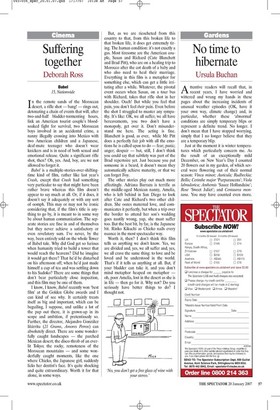Suffering together
Deborah Ross Babel 15, Nationwide In the remote sands of the Moroccan desert, a rifle shot — bang! — rings out, detonating a chain of events that will, after two-and-half bladder-tormenting hours, link an American tourist couple's bloodsoaked fight for survival, two Moroccan boys involved in an accidental crime, a nanny illegally crossing into Mexico with two American children and a Japanese, deaf-mute teenager who doesn't wear knickers and is in need of both sexual and emotional release. Quite a significant rifle shot, then? Oh, yes. And, boy, are we not allowed to forget it.
Babel is a multiple-stories-over-shiftingtime kind of film, rather like last year's Crash, except that Crash had something very particular to say that might have been rather brave whereas this film doesn't appear to say much at all. Or, if it does, it doesn't say it adequately or with any sort of oomph. This may or may not be ironic considering that, if the film's title is anything to go by, it is meant to in some way be about human communication. The separate stories are fine in and of themselves but they never achieve a satisfactory or even revelatory sum. I've never, by the way, been entirely sold on the whole Tower of Babel tale. Why did God get so furious when humanity tried to build a tower that would reach the heavens? Did he imagine it would get there? That he'd be disturbed on his afternoon off, when he'd just made himself a cup of tea and was settling down to his Sudoko? There are some things that don't bear particularly close inspection, and this film may be one of them.
I know, I know, Babel recently won 'best film' at the Golden Globe awards and I can kind of see why. It certainly treats itself as big and important, which can be beguiling, I suppose, and unlike a lot of the pap out there, it is grown-up in its scope and ambition, if pretentiously so. Further, the director, Alejandro Gonzalez Ifiarritu (21 Grams, Amores Pen-os) can absolutely direct. There are some wonderfully caught landscapes — the parched Mexican desert; the disco-throb of an everlit Tokyo; the rocky, remoteness of the Moroccan mountains — and some wonderfully caught moments, like the one where Chieko, the Japanese girl, suddenly licks her dentist's face. It's quite shocking and quite extraordinary. Worth it for that alone, in some ways.
But, as we are ricocheted from this country to that, from this broken life to that broken life, it does get extremely tiring. The human condition: it's not exactly a gas. Most tiresome are the American couple, Susan and Richard (Cate Blanchett and Brad Pitt), who are on a healing trip to Morocco after the cot death of a baby and who also need to heal their marriage. Everything in this film is a metaphor for something else, which can get a little irritating after a while. Whatever, the pivotal event occurs when Susan, on a tour bus with Richard, takes that rifle shot in her shoulder. Ouch! But while you feel that pain, you don't feel their pain. Even before the shot I struggled to muster any sympathy. It's like: OK, we all suffer, we all have bereavements, you two don't have a monopoly, get over it. Don't misunderstand me here. The acting is fine. Blanchett is good, as ever, while Mr Pitt does a perfectly fair job with all the emotions he is called upon to do — fear; panic; anger; despair — but, still, I don't think you could say that subtlety was part of the Brad repertoire yet. Just because you put someone in a beard, it doesn't mean they automatically achieve maturity, or that we can forget Troy.
The other stories play out much more affectingly. Adriana Barraza is terrific as the middle-aged Mexican nanny, Amelia, who is left behind in San Diego to look after Cate and Richard's two other children. She oozes maternal love, and communicates it perfectly, but when a trip over the border to attend her son's wedding goes nastily wrong, yup, she must suffer too. But the best bit, by far, is the Japanese bit. Rinko Kikuchi as Chieko nails every nuance in the most spectacular way.
Worth it, then? I don't think this film tells us anything we don't know. Yes, we are divided and, yes, we all suffer and, yes, we all crave the same thing: to love and be loved and be understood in the world. That's if it tells us anything at all. But, if your bladder can take it, and you don't mind metaphor heaped on metaphor — oh, poor Amelia, lost in the desert as she is in life — then go for it. Why not? Do you seriously have better things to do? I thought not.





















































 Previous page
Previous page